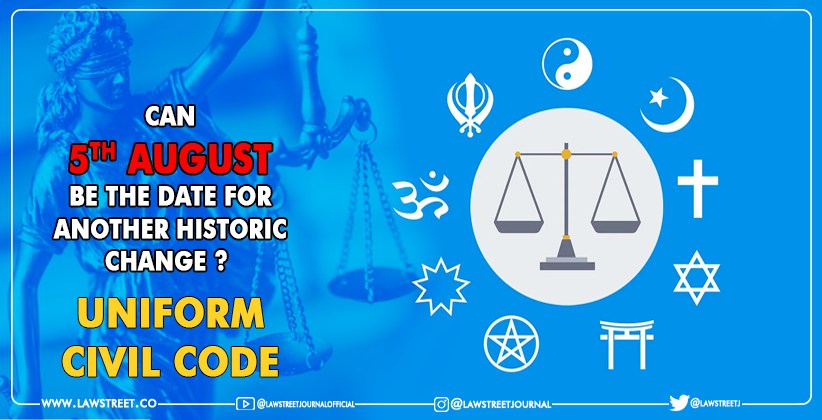5th August,2019 is the historic date when the Article 370 was abrogated. This 5th August 2021, India needs another historic change, the Uniform Civil Code. India has one penal code, one election code, now its time that all Indians have a Uniform Civil Code (UCC).
What is UCC?
Uniform Civil Code means similar laws regarding the civil/personal life of all citizens. UCC is enshrined in Art 44 of the Constitution.
The State shall endeavour to secure for the citizens a uniform civil code throughout the territory of India Article 44, Indian Constitution
UCC concerns with 4 important aspects of civil life: Marriage, Divorce, Adoption, and In-Heritance. Currently, these fall under the umbrella of Personal laws. For example, Hindus have different personal laws for marriage and divorce, and Muslims have different ones. These laws vary greatly and often infringe the right to equality and other human rights.
A Uniform Civil Code will eliminate the boundaries of personal laws and India will be ruled by a Uniform Civil Code. Every woman will have the same right to divorce. Everyone will have the same right to inheritance.
Historical Background
UCC has been in the political debate for decades. Our constitution makers including Nehru and B.R Ambedkar believed that India needs a common civil code. Baba Saheb Ambedkar said that the absence of UCC will hinder governments attempts at social reforms.
However, it was agreed to put UCC as a choice for future decision makers. UCC put in the concurrent list as a directive principle giving both the state and Centre the power to make laws regarding it. Goa is the first and the only Indian State to have a Uniform Civil Code.
The Supreme Court, on several occasions, pressed for the importance of a Uniform Civil Code. In Shah Bano Case, the Supreme Court observed that it is a matter of regret that UCC has remained a dead letter.
The Delhi High Court said recently that boundaries of religion, community and castes are slowly blurring in the modern India. Therefore, a Uniform Civil Code is necessary and desirable.
Why do we need UCC?
Personal laws, in the name of religious freedom are the root cause of a number of problems. India needs a well prepared UCC to govern civil life of all citizens.
All Personal laws are discriminatory against women. While Hindu women have equal rights to inherit their fathers property, Muslim women are deprived of it. Similarly, the minimum age for marriage for girls is 18 and for boys it is 21. There is no apparent reason for this gap. According to WHO, the appropriate age for marriage should be above 20 for both boys and girls.
While Hindu Code Bill modified the Hindu Personal Law. There have been minimal efforts to reform the Muslim Personal Law.
Polygamy is allowed in Muslim Personal Law for men, where men can marry again even if they are still married to the first wife. Also, women get negligible alimony after divorce and for a shorter period than Hindu women. Moreover, adoption is not allowed in the personal laws of Christians, Jews, Muslims and Parsis.
UCC will not hinder anyones religious freedom. India already has a common penal code which applies to everyone. All communities have accepted the IPC despite having their own criminal codes. Therefore, accepting UCC should not be a problem.
Law Street Journal Observation:
There has been much delay over a Uniform Civil Code. Now is the perfect time to initiate the changes for a better India. The ruling party has majority in both houses and the situations are apt to finally deliver what our constitution makers dreamed of.








